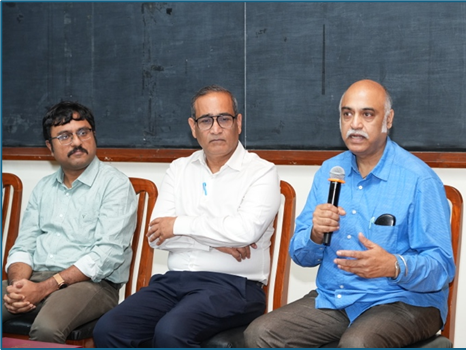
To recognise contributions by faculty that directly and positively impact the process of student learning and promote a culture of excellence in teaching at all levels, the Indian Institute of Science (IISc), Bengaluru presents the IISc Awards for Excellence in Teaching every year. The awardees for 2025 include Anoop Thomas (Assistant Professor, Department of Inorganic and Physical Chemistry), Debdeep Sarkar (Assistant Professor, Department of Electrical Communication Engineering), Vaibhav Katewa (Assistant Professor, Robert Bosch Centre for Cyber-Physical Systems), Abhik Narayan Choudhury (Associate Professor, Department of Materials Engineering), Utpal S Tatu (Professor, Department of Biochemistry), and L Umanand (Professor, Department of Electronic Systems Engineering).
A special programme was organised to felicitate the awardees on 08 September 2025. The recipient of the 2025 Prof Priti Shankar Teaching Award for Assistant Professors—Ananth Govind Rajan (Assistant Professor, Department of Chemical Engineering)—was also present and participated in a panel discussion on teaching, along with the other awardees. The following is a summary of the opinions and suggestions of the awardees on select topics.

Adapting teaching content for students from various age groups attending the same course
With the use of artificial intelligence (AI) agents, Bloom’s taxonomy fails. This framework categorises educational goals and was developed in 1956 by a Committee of Educators, chaired by Benjamin Bloom (see figure; source: Wikipedia).


Instead of Bloom’s taxonomy, the Universal Design for Learning (UDL) framework could be adopted; this addresses learners with variabilities and different challenges. The core concept is multi-modal delivery and multi-modal response from students. Problem-solving capabilities can be brought into the classroom. AI agents could also be included in UDL. The approach goes from teacher-centric to learner-centric.
In IISc, undergraduate (UG), Master’s, and PhD students can take the same courses. While the UG students are unbiased and ask questions without inhibition, Master’s students have more exposure, and PhD students are more mature and think before asking questions. Undergraduates are a great measure of a teacher’s performance in class. They are free spirits and cannot be forced to do something, and so, if a UG student shows up in class, the teacher can consider himself/herself lucky! The UG students ask a lot of difficult questions and so, the teachers are forced to think. They also have many viewpoints. On the contrary, PhD students are supportive and polite, and often, do not challenge the teachers. Here, group work works best for democratisation.

Moreover, the level of understanding and willingness to engage vary among students and so, it is necessary to explain the concept at multiple levels. Teaching assistants usually spend extra time with students having difficulty in understanding a topic.
Many students do not have a background of the subject. Hence, going into the history of a concept/subject before handling the topic itself evokes student curiosity and interest, whether they are UGs, Master’s students or PhDs.
Desired qualities in teachers

Changing role of teachers in this age of easy access to information
In an age where information is readily available, what role does a teacher play in a student’s education and life? To be relevant as a teacher in this present day, it is required to shift from information-based to analytical-based teaching and evoke thought processes beyond information. As knowledge is available, the teacher can act as a facilitator and teach students about how the information was arrived at, explain and discuss concepts, how to create new information; contextualise problems; focus on the applications of existing information; inculcate a healthy level of scepticism/questioning in students on the information generated by large language models.

How do teachers stay relevant?

Teachers have to raise the bar of their teaching. Teaching needs to move away from Bloom’s taxonomy and be behaviour-centric, and the curriculum should allow this shift. The delivery/visualisation of the subject/storytelling capability makes teachers important even though information is available.
Teachers should make students ‘think’ about concepts and applications of concepts. Students can be encouraged to interact in groups, solve problems in groups (mini projects), and interact with their teachers as peers. They can give presentations with other students asking questions.
There are two parts to learning. One is the content and the second is the emotional part— inspiration and engagement—which cannot be done by large language models or the Internet.
